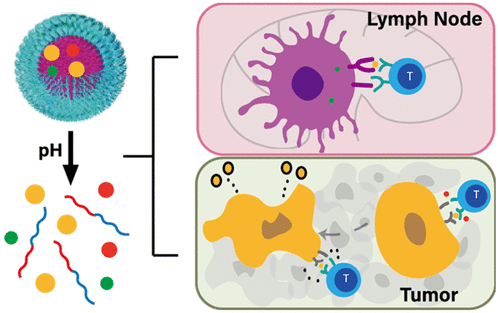当前位置:
X-MOL 学术
›
Acc. Chem. Res.
›
论文详情
Our official English website, www.x-mol.net, welcomes your feedback! (Note: you will need to create a separate account there.)
Nano-Immune-Engineering Approaches to Advance Cancer Immunotherapy: Lessons from Ultra-pH-Sensitive Nanoparticles
Accounts of Chemical Research ( IF 18.3 ) Pub Date : 2020-10-16 , DOI: 10.1021/acs.accounts.0c00475 Suxin Li , Zachary T. Bennett , Baran D. Sumer , Jinming Gao
Accounts of Chemical Research ( IF 18.3 ) Pub Date : 2020-10-16 , DOI: 10.1021/acs.accounts.0c00475 Suxin Li , Zachary T. Bennett , Baran D. Sumer , Jinming Gao

|
Immunotherapy has transformed the field of oncology and patient care. By leveraging the immune system of the host, immunostimulatory compounds exert a durable, personalized response against the patient’s own tumor. Despite the clinical success, the overall response rate from current therapies (e.g., immune checkpoint inhibitors) remains low (∼20%) because tumors develop multiple resistance pathways at molecular, cellular, and microenvironmental levels. Unlike other oncologic therapies, harnessing antitumor immunity requires precise activation of a complex immunological system with multiple levels of regulation over its function. This requires the ability to exert control over immune cells in both intracellular compartments and various extracellular sites, such as the tumor microenvironment, in a spatiotemporally coordinated fashion.
中文翻译:

推进癌症免疫治疗的纳米免疫工程方法:超 pH 敏感纳米粒子的经验教训
免疫疗法已经改变了肿瘤学和患者护理领域。通过利用宿主的免疫系统,免疫刺激化合物对患者自身的肿瘤产生持久的、个性化的反应。尽管取得了临床成功,但当前疗法(例如免疫检查点抑制剂)的总体反应率仍然很低(~20%),因为肿瘤在分子、细胞和微环境水平上发展出多种耐药途径。与其他肿瘤疗法不同,利用抗肿瘤免疫需要精确激活复杂的免疫系统,对其功能进行多层次的调节。这需要能够以时空协调的方式控制细胞内区室和各种细胞外部位(如肿瘤微环境)中的免疫细胞。
更新日期:2020-11-17
中文翻译:

推进癌症免疫治疗的纳米免疫工程方法:超 pH 敏感纳米粒子的经验教训
免疫疗法已经改变了肿瘤学和患者护理领域。通过利用宿主的免疫系统,免疫刺激化合物对患者自身的肿瘤产生持久的、个性化的反应。尽管取得了临床成功,但当前疗法(例如免疫检查点抑制剂)的总体反应率仍然很低(~20%),因为肿瘤在分子、细胞和微环境水平上发展出多种耐药途径。与其他肿瘤疗法不同,利用抗肿瘤免疫需要精确激活复杂的免疫系统,对其功能进行多层次的调节。这需要能够以时空协调的方式控制细胞内区室和各种细胞外部位(如肿瘤微环境)中的免疫细胞。


























 京公网安备 11010802027423号
京公网安备 11010802027423号